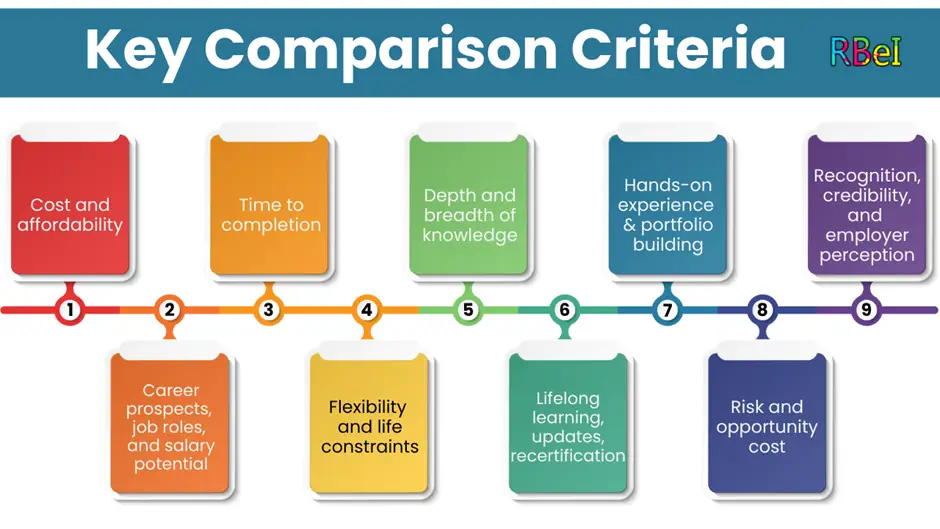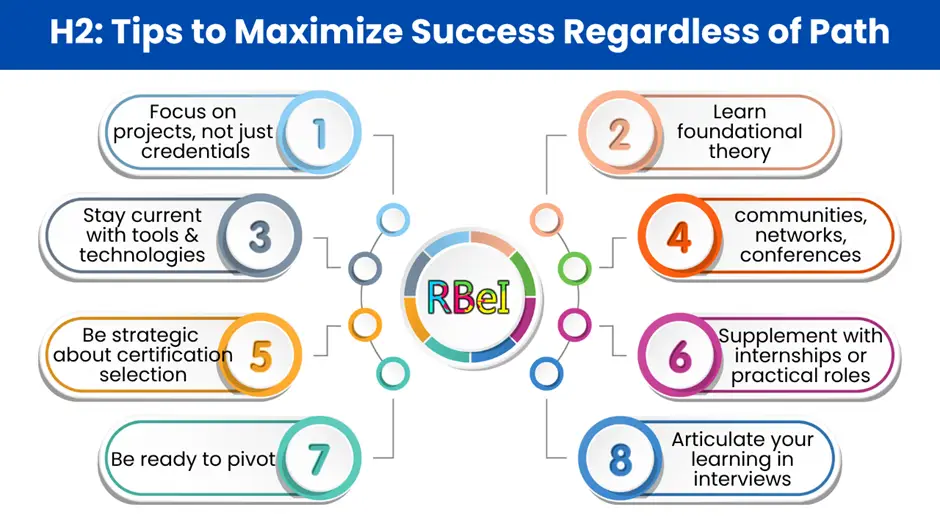In today’s competitive job market, many students and early professionals ask: should I pursue a data analytics degree or go for a data analytics certification (or certificate)? This decision can significantly influence your time, cost, skill depth, job opportunities, and long-term career growth. In this blog, we’ll clearly compare data analytics degree vs certification / certificate, weigh their pros and cons, and help you decide which path best fits your goals. Whether you’re fresh out of high school, planning a career switch, or just looking to level up, this guide will be useful.
Table of Contents
ToggleWhy this debate matters: keywords, demand, and clarity
Before diving in, let me explain why this choice matters. The keywords data analytics degree and data analytics certification are important because many prospective learners search for them. Employers and hiring managers also often distinguish between candidates with formal degrees and those with certificate credentials. Moreover, the field of data analytics is growing fast: according to reports, demand for data professionals continues to rise as organizations rely more on data-driven decisions. Thus, knowing which educational path gives you the best return on investment is critical.
Definitions & Distinctions: What exactly are a Data Analytics Degree and Certification?
Before comparing pros and cons, let’s define what each term generally means, and clarify how they differ in structure, recognition, and purpose.
What is a “Data Analytics Degree”?
A data analytics degree typically refers to a formal academic program offered by a college or university. It might be a bachelor’s degree (e.g. “BSc in Data Analytics,” “Bachelor of Science in Analytics,” or related majors such as Statistics, Computer Science, or Business Analytics) or a master’s degree (e.g. “Master in Business Analytics,” “MS Data Analytics,” “MS in Analytics”).
Key features:
- Comprehensive curriculum covering foundational mathematics, statistics, programming, data mining, machine learning, database systems, big data, data visualization, ethics, etc.
- Duration: Often 3 to 4 years for bachelor’s; 1 to 2 years for master’s (full time).
- General education / liberal arts requirements: You may have to take non-analytics courses (humanities, languages, electives) in many degree programs.
- Institutional accreditation & recognition: Degrees are accredited by universities, which often carry prestige.
- Depth, theory, research: Degree programs tend to emphasize theoretical foundations, research, and long-term intellectual depth.
What is a “Data Analytics Certification / Certificate”?
A data analytics certification (or certificate) is a shorter non-degree credential, often offered by professional bodies, online learning platforms, training institutes, or universities as continuing education. It is intended to validate one’s skills in specific tools, techniques, or domains of analytics.
Key features:
- Focused curriculum: Often limited to core topics like data cleaning, SQL, Excel, data visualization, basic statistics, maybe Python or R.
- Shorter duration: Weeks to months (e.g. 3–9 months).
- Flexibility: Many are online, self-paced, or part-time.
- Lower cost: Generally cheaper than a full degree.
- Skill validation: The certificate often signals proficiency or completion of training, but not always deep theory or research.
It’s also worth noting that in some contexts, “certificate program” refers to the academic certificate (offered by a university), whereas “certification” refers to a professional credential (requiring exams, ongoing recertification). But in this blog, I use “certification / certificate” broadly to cover non-degree credential programs in data analytics.
Key Comparison Criteria
To compare a data analytics degree vs a data analytics certification, we’ll examine along multiple critical dimensions:

1. Cost and affordability
Data Analytics Degree (Pros & Cons)
Pros
- You often gain powerful scholarship, financial aid, or government support in academic settings.
- Because you are enrolled full time, you may get institutional facilities (labs, software licenses, libraries) included in fees.
Cons
- Tuition for a 3–4-year bachelor’s or 1–2-year master’s is high, especially in private or foreign universities.
- Hidden costs: textbooks, software, travel, campus housing, opportunity cost of not working full time.
- You may graduate with debt.
Data Analytics Certification (Pros & Cons)
Pros
- Generally far cheaper than a full degree.
- You pay only for the specific certificate program (tuition, subscription, exam fees), often in installments.
- Lower risk: if a certificate program doesn’t suit you, the financial loss is smaller.
Cons
- Some certificate programs are overpriced relative to their value (especially less reputable ones)
- You might not qualify for financial aid, scholarships, or subsidies the way degrees do.
Verdict on Cost
If budget is the key constraint, a data analytics certification is usually a less risky and more accessible starting path. That said, if you can secure low-cost (or subsidized) degree options, paying for a full degree could be more worthwhile over the long term.
2. Time to completion
Data Analytics Degree (Pros & Cons)
Pros
- Once committed, you have a structured timeline (e.g. 3 years or 4 years) to complete your learning.
- You may have summer internships, research semesters, etc., integrated.
Cons
- It’s a long-term commitment.
- You may not be able to pivot or adjust quickly to new industry trends.
- If you drop out, partial credits may not be fully transferable.
Data Analytics Certification (Pros & Cons)
Pros
- Much faster: many programs finish in a few months or under a year
- You can begin learning and applying skills quickly.
- Switching among certificate tracks is easier.
Cons
- Shorter time means less chance for deep mastery or breadth.
- If you try to cram too much in a short time, you may lose on learning quality.
Verdict on Time
If you want to get working quickly or test the field, a data analytics certification gives you speed. But if you want deep foundations and stability, a data analytics degree is worth the longer timeline.
3. Depth and breadth of knowledge
Data Analytics Degree (Pros & Cons)
Pros
- Provides strong foundation: mathematics, statistics, algorithmic thinking, theory, ethics, optimization.
- You are exposed to a variety of topics: discrete math, data structures, operating systems, distributed computing, advanced electives.
- You understand why methods work, not just how.
- Long-form projects, research opportunities, peer collaboration.
Cons
- A lot of coursework may not be directly relevant to real-life analytics (general education, unrelated electives).
- Some courses may lag in updating to the latest tools or industry practices.
Data Analytics Certification (Pros & Cons)
Pros
- Focused on practical, in-demand topics (e.g. SQL, Tableau, Python, data cleaning).
- Good for skill updating or specialization (e.g. time series analysis certificate, business analytics certificate)
- More agile to adapt to new industry trends.
Cons
- Less theoretical depth: many certificate programs skip advanced math, proofs, algorithmic complexity.
- You might not build the underlying knowledge needed to adapt when tools and methods shift.
Verdict on Depth
If your goal is mastery, ability to adapt to new methods, or eventual leadership roles, the data analytics degree offers stronger depth. But for developing employable skills quickly, a data analytics certification works well.

Deepak Goyal CFA & FRM
Founder & CEO of RBei Classes
- 16,000+ Students Trained in CFA, FRM, Investment Banking & Financial Modelling
- 95% Students Successfully Placed • 94.6% Pass Rate In Exam
4. Hands-on experience & portfolio
A major deciding factor in data analytics roles is evidence — a portfolio of real projects, internships, or contributions. Let’s see how each path supports that.
Data Analytics Degree (Pros & Cons)
Pros
- Many degree programs include capstone projects, lab assignments, research, internship semesters, or co-ops.
- You may have access to supervised faculty-led projects, data labs, funded research datasets.
- Peer collaborations and longer-term projects help build deep portfolios.
Cons
- In some academic programs, projects may be hypothetical or textbook-based (not real business data).
- Access to industry data or up-to-date tools may be limited due to licensing or infrastructure.
Data Analytics Certification (Pros & Cons)
Pros
- Many certificate programs emphasize hands-on projects, capstone work, real datasets, and deliverable portfolios.
- Because certificate programs are modular, you can pick ones that emphasize project work.
- You can more easily combine multiple certificate courses to build up a broader portfolio.
Cons
- Some certificate programs have minimal or no real-world data; they might rely more on toy datasets or assessments without deep projects
- The scale of projects is often limited by time and resource constraints.
Verdict on Hands-on Experience
It’s not the credential that matters so much, but what you build. Whether degree or certification, prioritize programs that require you to complete and showcase real-world data analytics projects.
5. Recognition, credibility, and employer perception
How your credential is viewed by hiring managers can make or break job opportunities. Let’s explore.
Data Analytics Degree (Pros & Cons)
Pros
- A recognized university degree carries prestige and signals perseverance, rigor, and broad learning.
- Some employers and industries (finance, healthcare, government, academia) prefer or require degrees.
- It suits long-term career growth and positions that emphasize research or management.
Cons
- In some tech-forward organizations, degrees may not be heavily weighted if your skills and portfolio are strong.
- If your degree institution is not well-known, the prestige might not help as much.
Data Analytics Certification (Pros & Cons)
Pros
- Certifications can demonstrate initiative, continuous learning, and up-to-date skills.
- A well-known certificate (e.g. from Google, Microsoft, AWS, or a reputable institution) can carry weight.
- Especially helpful when you already have a degree in another field (you can “prove” your analytics competency).
Cons
- Many hiring managers treat certifications as secondary — they often value experience and demonstrated skills more than certificates alone
- Some certificates are too generic; employers may question their rigor or relevance.
- In many cases, a certificate “adds nothing” if you can’t show concrete outcomes.
In fact, Dataquest argues that certifications themselves aren’t strong predictors of job success and may sometimes be ignored by hiring managers if not supported by real work.
Verdict on Recognition
A data analytics degree often has stronger default credibility. However, a data analytics certification that’s well-chosen, especially paired with a strong portfolio or prior degree, can also help you stand out — especially as you advance.
6. Career prospects, job roles, and salary potential
Let’s examine how each path positions you for roles, growth paths, and compensation.
Data Analytics Degree (Pros & Cons)
Pros
- Opens doors to higher-level roles (e.g. data scientist, analytics manager, research analyst) especially in companies that require master’s or PhD credentials.
- Better foundation for promotions, leadership tracks, technical depth, or shifting into machine learning / AI roles.
- Some high-paying roles prefer or require degrees.
- More mobility: with a degree, you can more easily transition to related domains (data engineering, modeling, ML, academia).
Cons
- Entry-level roles may not differ much initially (you may have to start as a junior analyst regardless).
- In slower-moving spaces, the degree advantage may take longer to show.
Data Analytics Certification (Pros & Cons)
Pros
- Good entry point: you can land junior data analyst / business analyst roles quicker.
- Useful for upskilling or pivoting from a non-analytics role.
- Helps you claim harder skills in your resume and interview.
- Some mid-level roles may accept certification + experience instead of formal degree.
Cons
- Getting stuck in “junior” roles: later, lack of depth may hinder promotion beyond a certain point.
- Some advanced roles might require deeper knowledge which a certificate alone doesn’t provide.
- Salary ceiling might be lower without further education or significant experience.
Overall, the data analytics degree gives you more upward potential, while a data analytics certification is often a way in or a boost early on. Of course, regardless of path, your skills, performance, and projects will heavily influence your career trajectory.
7. Flexibility, constraints, and lifestyle factors
Your personal circumstances may strongly influence the decision. Let’s see how each path fares in flexibility.
Data Analytics Degree (Pros & Cons)
Pros
- Many universities now offer online, part-time, or hybrid degree programs.
- You get structure and scheduled pacing, which can help maintain discipline.
Cons
- Less flexible, especially if the degree is full time or on-campus.
- You may need to relocate or attend physically, and adjust your life schedule.
- Harder to balance with full-time work or family responsibilities.
Data Analytics Certification (Pros & Cons)
Pros
- Extremely flexible: many programs are online, self-paced, modular.
- You can fit learning around work, family, or other obligations.
- Easier to pause or shift direction midway.
Cons
- Less structure — you need self-discipline to finish.
- Without deadlines, many learners delay or drop out.
For those working, having family responsibilities, or needing flexibility, a data analytics certification often fits better. But if you can commit to a structured environment, a data analytics degree gives you clearer milestones.
8. Lifelong learning, updates & recertification
In a fast-evolving field like data analytics, continuing education is essential.
Data Analytics Degree
- The degree gives strong fundamentals, but some content (specific tools, software) may become outdated.
- After graduation, you still need to learn new tools, updates, libraries, methods.
- Universities may offer alumni courses or continuing education, but many onus remains on you.
Data Analytics Certification
- Many certificates require periodic renewal or continuing education (thus encouraging you to stay current).
- Some are modular: you can take new certificate modules when needed (e.g. adding “deep learning certificate”).
- Because certificate programs are often newer and modular, they tend to reflect recent industry trends.
Thus, certificate paths can make it easier to stay updated, but degrees give a foundational base you can build upon. Often, the best practice is: get a strong foundational degree (if possible), and continue supplementing with certificates and short courses.
9. Risk and opportunity cost
Finally, let’s consider the risks and opportunity cost of each path.
- If you commit to a 3–4 year degree and later decide analytics isn’t for you, the investment is large.
- Conversely, over-investing in many certificate courses without synergies may waste time and money.
- Opportunity cost of not working for several years might outweigh the degree benefits in some cases.
- Also, industries change: the tools and platforms today may evolve — what matters is adaptability.
So, weigh whether you want a guaranteed long-haul path (degree) or a lower-risk modular path (certificates). In many cases, combining both (degree + targeted certificates) yields the best risk balance.
Pros & Cons Summary Table
Here’s a side-by-side summary of the advantages and drawbacks of a data analytics degree vs a data analytics certification / certificate:
| Criteria | Data Analytics Degree | Data Analytics Certification / Certificate |
| Cost | High tuition, potential debt | Lower cost, less financial risk |
| Time | Longer (3-4 years bachelor / 1-2 years master) | Shorter (months to under a year) |
| Depth / Breadth | Strong fundamentals, theoretical depth | More focused, tool-oriented, less theory |
| Hands-on & Portfolio | Capstone, research, internships | Projects, capstone, modular but smaller scale |
| Recognition / Credibility | Strong default recognition by employers | Varies by certificate, sometimes secondary |
| Career Prospects & Salary | Better long-term growth and leadership potential | Good entry-level path, possible ceiling without further growth |
| Flexibility / Life Fit | Less flexible in traditional on-campus form | Highly flexible, modular, fits around life constraints |
| Updates / Recertification | Foundation may age, need self-learning | Certificates often evolve, may require renewal |
| Risk / Opportunity Cost | High investment, risk if pivot later | Lower risk, modular path but possibly fragmented |
How to Decide: Which Path is Better for You?
Given all of the above, here is a structured approach you can follow to decide between a data analytics degree and a data analytics certification (or certificate):
Step 1: Clarify your goals and timeline
- Are you trying to land a job quickly, or planning for a long-term analytics career?
- Do you prefer deep theoretical foundations or you just want proficiency in tools and workflows?
- Are you open to working in data-adjacent roles, or do you want a specific analytics job?
- What is your timeline (months vs years) and how soon do you need returns?
Step 2: Assess your resources and constraints
- How much money can you invest now (tuition, living costs, opportunity cost)?
- How much time can you commit per week?
- Do you need flexibility (working, family obligations)?
- Are there good degree programs accessible to you (locally or online)?
Step 3: Evaluate program quality, not just credential
- For certificates: check whether they include real projects, capstones, mentorship, up-to-date tools, and good reviews.
- For degrees: check faculty strength, university reputation in analytics, research opportunities, internship networks.
Step 4: Blend strategies (when possible)
You don’t always have to choose exclusively one path. Many successful professionals combine both.
- Start with a data analytics certification to gain essential skills and test your interest.
- Later, enroll in a data analytics degree (or master’s) part-time or online, using your certificate credits.
- After or during your degree, supplement with niche certificates to stay current (e.g. time series, NLP, big data platforms).
- Use portfolio projects and internships to demonstrate real skills; credentials only support but do not replace evidence of work.
Step 5: Monitor and pivot
- Once you begin, periodically evaluate whether the chosen path is serving you well.
- Be willing to pivot: if certificate alone isn’t enough for promotion, consider enrolling in a degree.
- Conversely, if your degree lacks practical exposure, pick up targeted certificates or bootcamps to plug gaps.
Real-world Examples & Evidence
To make this more concrete, let’s look at some real-world insights, anecdotes, and data.
Industry perspectives on certificates
- As noted earlier, Dataquest conducted interviews and found that hiring managers often do not prioritize certificates in their evaluation; they looked more at hands-on skills and experience.
- Many online certificate programs attempt to market themselves as “job-ready” credentials, but their real value is in the skills you gain, not the badge itself.
- A well-structured certificate, especially one from a recognized provider like Google, Microsoft, or university extension, can be a differentiator, especially when backed by real projects.
Academic degree vs bootcamp insights
- A blog post comparing bootcamps vs degree states that bootcamps are more intensive and career-focused, allowing faster entry into analytics roles, whereas degrees are more comprehensive but long-term.
- The Noble Desktop comparison highlights that certificate programs are more condensed, cost less, and let you specialize, while degrees include general education and require more time.
- In the “Data Science Degrees vs Certification” comparison, Strata Scratch argues that degrees provide deeper theoretical grounding and breadth (algorithms, ethics, advanced topics) that certificates often lack.
Anecdotes and user experiences
- On Reddit, a user comparing “Data Analytics Degree vs Certificate” said:
“The certificates all seem like shortcuts but you can’t become an expert via shortcuts. A degree takes longer because it goes way more in depth than most short programs.”
This reflects the sentiment that certificates may jumpstart entry, but mastery usually requires sustained depth.
- Another user praised the Google certificate:
“It’s pretty decent in exposing you to what data analytics is and the tools you’re likely to use. It’ll definitely help you prepare for interviews.”
Academic research on combining degree + certifications
A recent study on “Skill-Driven Certification Pathways” shows compelling evidence that combining formal degrees with targeted industry certifications increases employability in technology roles, by aligning educational credentials with job market demand.
This suggests that a hybrid approach — baseline degree plus certifications — can yield better outcomes.
Recommended Certificates (Tools & Topics) to Consider
If you decide to go the certificate route (or supplement your degree), here are some valuable topics and recognized certificates to look for:
- Google Data Analytics Professional Certificate
- Covers R, SQL, data cleaning, data visualization, metrics.
- Flexible and beginner-friendly. Good for breaking into analytics roles.
- Tableau Desktop Specialist / Certified Associate / Tableau certifications
- Useful for data visualization specialization.
- Microsoft Certified: Data Analyst Associate (using Power BI)
- Widely used in enterprise settings.
- AWS / Azure / Google Cloud certifications (e.g. BigQuery, AWS Data Analytics)
- For analytics in cloud & big data contexts.
- Specialty certificates: time series analysis, predictive analytics, machine learning, natural language processing (NLP), data engineering pipelines.
- Statistics / Probability certificates — to deepen theoretical foundations, if your certificate path lacks them.
When choosing a certificate, ensure:
- It includes real, hands-on project work.
- It is recognized or respected in your target industry.
- It is up to date with current industry tools (e.g. the latest versions of Python libraries, BI tools, etc.).
- It provides support (mentorship, community, feedback).
Sample Paths: What a Student Might Do
Here are some sample trajectories illustrating how students might combine or choose paths:
Path A: Fast entry via certification, then degree
- Start with a Google Data Analytics Certificate (6 months) to gain core skills.
- Build a portfolio with real projects (e.g. public datasets, Kaggle).
- Apply to an online Bachelor’s in Data Analytics (part-time or modular) and transfer some certificate credits if allowed.
- Continue taking niche certificates (e.g. machine learning, cloud analytics) during degree.
This gives speed plus long-term credentials.
Path B: Full Degree first, then specialization certificates
- Enroll in a Bachelor’s in Data Analytics / Statistics / Computer Science (3–4 years).
- During degree, do internships, join projects, research.
- Supplement with certifications (Power BI, Tableau, cloud analytics) to stay updated.
- For master’s or roles, rely on both credentials and portfolio.
Path C: Certificate-only pathway (for flexible, self-driven learners)
- Choose a strong, project-based data analytics certificate (or multiple ones).
- Build a GitHub / portfolio with intermediate to advanced projects.
- Land junior analytics roles.
- After gaining 2–4 years experience, possibly pursue a master’s degree or advanced certification for promotion.
While this path is riskier, many succeed via strong work record and continuous upskilling.







